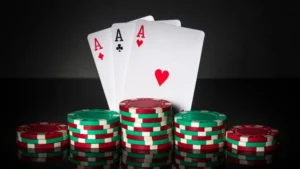Poker has long sparked debate among players, analysts, and regulators about whether it’s primarily a game of skill or luck. While chance undeniably plays a role in the short term, poker’s long-term outcomes are often determined by a https://holdempokeronlineplay.com/ player’s strategic ability, decision-making, and psychological awareness. Understanding the balance between skill and luck is crucial for new and experienced players alike.
The Role of Luck in Poker
Luck is an inherent part of poker because the cards are dealt randomly. You cannot control what cards you receive or what the community cards will be. This randomness means that even the best players can lose a hand to a less experienced opponent. Short-term outcomes are heavily influenced by chance, especially in single hands or small sample sizes.
For example, a beginner could win a tournament by catching a series of lucky draws, while a seasoned player might face elimination after a string of unlucky hands. These possibilities often give the impression that poker is mainly a game of luck.
How Skill Influences Outcomes
Over time, however, skill begins to overshadow luck. Skilled poker players consistently outperform less experienced players across thousands of hands. They use mathematical strategies, read opponents’ behaviors, and manage their bankrolls effectively. They also understand concepts such as pot odds, hand ranges, and table positioning, which give them an edge in decision-making.
The fact that some players regularly win over long periods is a clear indicator that poker involves more than just luck. Just like in sports or chess, consistent success in poker results from studying the game, analyzing situations, and adapting strategies.
Decision-Making and Psychology
Poker is as much a mental game as it is a mathematical one. Successful players excel at reading others, concealing their own intentions, and making decisions under pressure. Bluffing, semi-bluffing, and controlling the pace of play are psychological skills that add a layer of complexity to poker far beyond mere chance.
Unlike games based purely on luck, poker rewards players who stay disciplined, remain emotionally stable, and adapt to changing table dynamics. These human elements further support the argument that poker is a game of skill.
Variance and Long-Term Play
Variance is the element of unpredictability that makes poker exciting and challenging. In the short term, luck may dominate. A weaker player might win a large pot simply by getting lucky on the river. However, over hundreds or thousands of hands, variance tends to balance out, and players who make better decisions consistently come out ahead.
This is why professional players focus on long-term results. They understand that short-term losses are part of the game, but a solid strategy will yield profits over time.
Legal and Competitive Recognition
In many jurisdictions, poker has been legally classified as a game of skill, especially in professional and regulated settings. This has paved the way for televised poker tournaments, sponsorships, and competitive rankings. The recognition of poker as a mind sport in some circles also reflects its emphasis on mental acuity over chance.
The Balance Between Luck and Skill
The reality is that poker is a unique blend of both skill and luck. Luck may win you a hand, but skill wins you a career. The luck factor keeps the game accessible and exciting, while the skill component allows for growth, mastery, and consistent profit for those who dedicate time and effort to learning the game.
FAQ
Can a beginner win against a professional in poker?
Yes, a beginner can win in the short term due to luck, but over time, a professional’s skill will usually lead to better outcomes.
How can I reduce the role of luck in my poker game?
Focus on improving your skills—study strategy, review your hands, and play consistently. The more informed your decisions, the less reliant you’ll be on luck.
Why do some people say poker is gambling if skill matters?
Poker involves risk and money like gambling, but the outcome isn’t based solely on luck. It combines chance with strategy, much like investing or sports betting.





